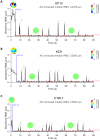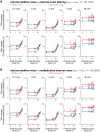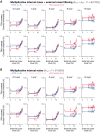Functional reallocation of sensory processing resources caused by long-term neural adaptation to altered optics
- PMID: 33616034
- PMCID: PMC7963487
- DOI: 10.7554/eLife.58734
Functional reallocation of sensory processing resources caused by long-term neural adaptation to altered optics
Abstract
The eye's optics are a major determinant of visual perception. Elucidating how long-term exposure to optical defects affects visual processing is key to understanding the capacity for, and limits of, sensory plasticity. Here, we show evidence of functional reallocation of sensory processing resources following long-term exposure to poor optical quality. Using adaptive optics to bypass all optical defects, we assessed visual processing in neurotypically-developed adults with healthy eyes and with keratoconus - a corneal disease causing severe optical aberrations. Under fully-corrected optical conditions, keratoconus patients showed altered contrast sensitivity, with impaired sensitivity for fine spatial details and better-than-typical sensitivity for coarse spatial details. Both gains and losses in sensitivity were more pronounced in patients experiencing poorer optical quality in their daily life and mediated by changes in signal enhancement mechanisms. These findings show that adult neural processing adapts to better match the changes in sensory inputs caused by long-term exposure to altered optics.
Keywords: adaptive optics; contrast sensitivity; human; long-term adaptation; neural compensation; neuroscience; optical blur; visual processing.
© 2021, Barbot et al.
Conflict of interest statement
AB, WP, CN, RZ, KH, DT, GY No competing interests declared
Figures




















References
-
- Artal P. Aging Effects on the Optics of the Eye. In: Cavallotti C. A. P, Cerulli L, editors. Age-Related Changes of the Human Eye. Humana Press; 2008. pp. 35–44. - DOI
Publication types
MeSH terms
Grants and funding
LinkOut - more resources
Full Text Sources
Other Literature Sources

